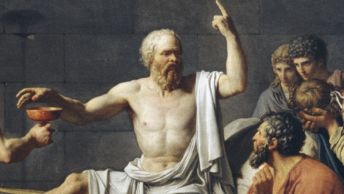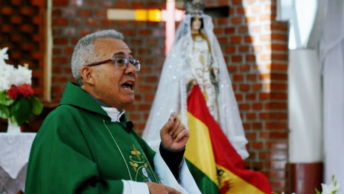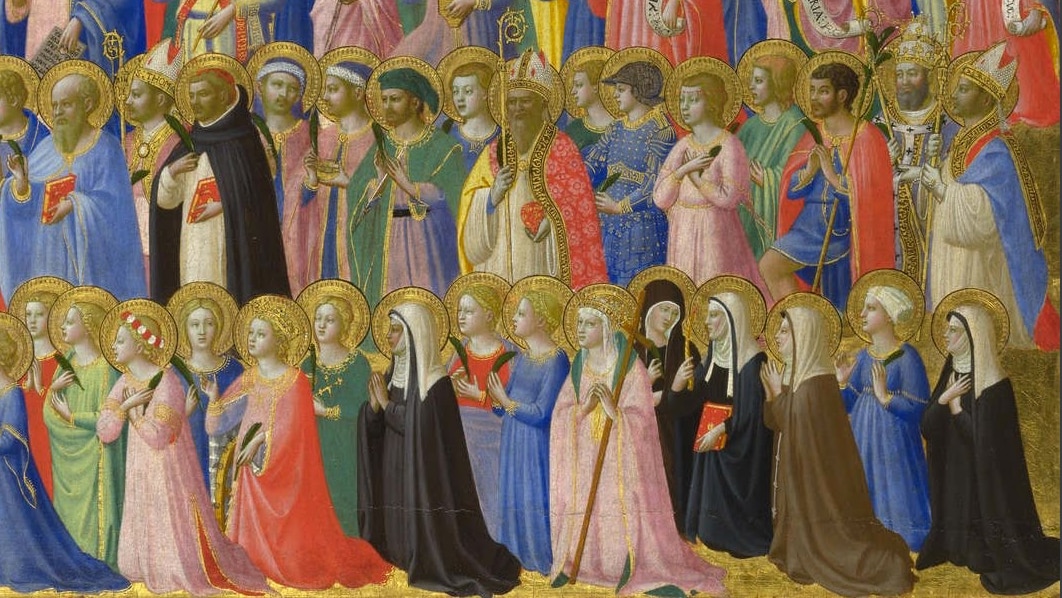The classic 19th century novel Quo Vadis, which was later made into a movie in 1951 and again in 2001, tells how the early Church slowly took root and began growing in Rome, in spite of being declared illegal and sometimes facing persecution by the authorities. In the story, a young Roman named Vinicius falls in love with a Christian girl — but she’ll have nothing to do with him because of his pagan lifestyle. Vinicius becomes very curious about just what it is these Christians believe, so one night he follows the girl to one of their secret gatherings. When St. Peter begins preaching about Jesus, Vinicius, hiding in the shadows, is deeply moved; he takes Peter’s rather surprising message very seriously, and begins thinking about what he’d have to do to become a Christian himself. Vinicius realizes he’d need to take two major steps: he’d have to leave be hind his old lifestyle with all its self – centeredness and sin, and he’d have to begin a new life, radically different from his past (Link, Illustrated Sunday Homilies, Year B, Series II, p. 3).The Latin title of the book, Quo Vadis, may be translated as “Where are you going?” — and this is the question we’re asked today. Are we on the proper path, or have we been led astray by sin? We believe that when we were baptized, we began a journey of faith. Have we continued in this direction? We claim to be followers of Jesus. Do our lives bear witness to this claim? We believe that true repentance means making the same choice that confronted Vinicius: giving up one way of life for a better one. Have we tried to do this? Truly following Jesus means turning away from sin and traveling the path that leads to life.
The theme of the readings for the Second Sunday of Advent is simple but very important: God has a plan of salvation — and this plan requires our active cooperation. The Prophet Isaiah (40:1-5, 9-11) presented a wonderful message to the Jewish exiles in Babylon: through the power of God, they would soon be returning home to Jerusalem. A special path would be prepared for them, and the Lord Himself would accompany them. Earthly kings, when traveling, sent work parties and messengers ahead of them to prepare the roads and make sure all was in order. God’s power and majesty is so great, however, that entire mountains and valleys will be leveled in preparation for His coming. The Lord’ s messenger goes ahead of Him to prepare His way — and in the Gospel of Mark (1:1-8), John the Baptist is presented as the fulfillment of this prophecy. John called people to repentance — that is, to leave behind their sinful lifestyles and to begin living in accord with God’ s law. This inner change would allow them to travel with the Messiah, or Savior, on the path of life.
Unlike Vinicius in the story Quo Vadis, and unlike the people of Judea and Jerusalem in the days of John the Baptist, we do not need a complete change of heart: we already accept Jesus as the Messiah. We have been baptized in water and the Holy Spirit, and we try to live as His followers. However, we can benefit from recommitting ourselves to patient endurance and trust as we put our faith into practice each day. This is the idea presented in the Second Letter of Peter (2 Pt 3:8-14).
St. Peter reminds us that the Lord’s apparent delay in returning for judgment is actually a sign of love: God gives sinners numerous chances to repent. In the same way, we can express our love for God by generous patience — in the sense of not growing discouraged no matter how difficult things become, not giving up our efforts to overcome our sins and improve ourselves as persons, and not losing sight of what’s truly important in life. As St. Peter says, while waiting for the Lord’s return, we should “be eager to be found without spot or blemish before Him, at peace [in His sight].”
In the days before satellites and GPS, travelers often relied upon maps — but maps weren’t always reliable. During the Age of Exploration over 500 years ago, cartographers or map-makers didn’t know what lay across the ocean, and wanting to warn brave travelers of possible danger, they wrote along the edge of their maps the words “Here be dragons” — in other words, “We don’t know what terrible things might be awaiting you.” During World War II, when the Germans invaded the Soviet Union, they relied on Russian maps; however, they soon discovered these maps were completely unreliable, showing roads and towns where none existed; this was a deliberate attempt by the Russians to cause chaos and disruption. Here in Michigan, the state government creates very detailed and accurate maps — though in the past, some state official had a sense of humor. Part of the state of Ohio is shown on a Michigan map, and at least one version of our map included two imaginary Ohio towns near Lake Erie: Go-Blue and Beat-OSU, referring to the Michigan – Ohio State college football rivalry. (If those fake towns are no longer on our maps, maybe they should be returned there in an effort to help change the Wolverines’ luck.)
The world will try to confuse us, telling us we’re going in the right direction by running after money, success, pleasure, and other distractions that may very well end up taking us away from God. As Christians, we know that life has a different and higher purpose, and as followers of Jesus, we hope and believe we are instead following the proper path. This being the case, we also have the responsibility of inviting others to join us. John the Baptist knew the Messiah was coming. He did not keep this knowledge to himself, but shared it with all who would listen. In the same way, we mustn’t lock our faith within ourselves, but must let our example attract other people. In the story Quo Vadis, St. Peter’s preaching deeply touched a young Roman and made him reexamine his life. Perhaps there’s someone like Vinicius hiding in the shadows of our life — someone watching us closely, listening to our words, considering the meaning of our lifestyle.
We don’t have to preach as Peter did, but we do have to give an example of faith and commitment and genuine concern. When we do, that might just be enough to convince someone else to join us, and in this sense, we’ll be helping prepare the Lord’s way. Today we’re asked the question, “Quo vadis — where are you going?” If we’re truly traveling with Jesus, the answer is simple: away from sin, and toward everlasting life.








